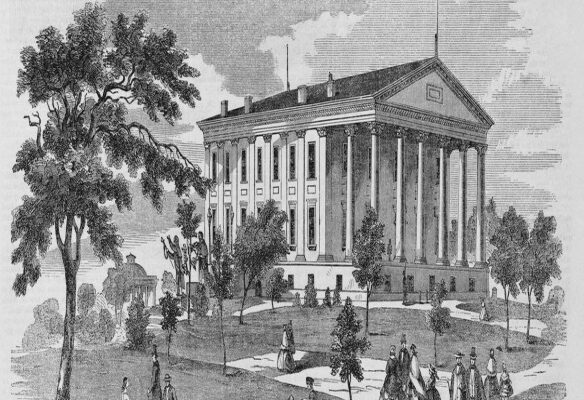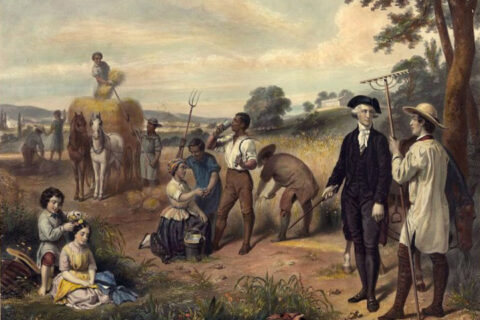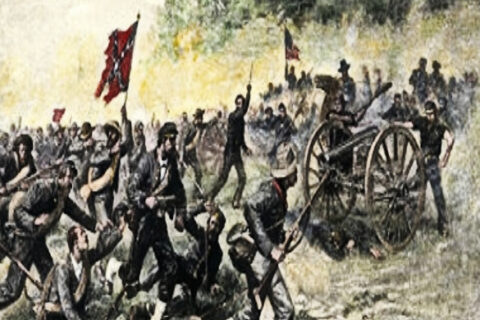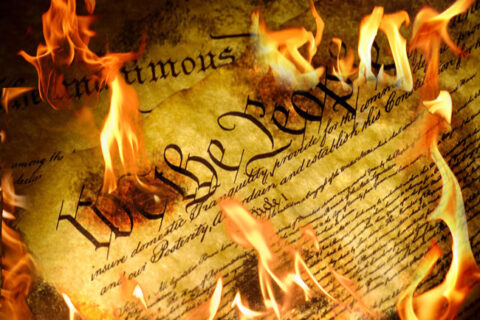“If centralism is ultimately to prevail; if our entire system of free Institutions as established by our common ancestors is to be subverted, and an Empire is to be established in their stead; if that is to be the last scene of the great tragic drama now being enacted: then, be assured, that we of the South will be acquitted, not only in our own consciences, but in the judgment of mankind, of all responsibility for so terrible a catastrophe, and from all guilt of so great a crime against humanity.”
Alexander Stephens
The second wave of states to leave the Union were the Upper South states. These included Virginia, North Carolina, Tennessee, Arkansas, and pro-Confederate Kentucky and Missouri, who held divided loyalties. The Upper South states of Virginia, North Carolina, Tennessee, and Arkansas had a more extensive free population than the Deep South and made up most of the Confederacy. In general, there was a difference in the causes of secession between the original seven seceding “Cotton States” of the Deep South and the remaining Upper South. When the Cotton States left the Union, the Upper South either turned down voting on withdrawal from the Union or voted against secession. Historian E. Merton Coulter writes, “The Majority sentiment in the Upper South had been unionist until Lincoln’s call for troops… Upper South… had cried equally against coercion as secession.”
When many historians talk about secession, they almost always ignore the Upper South; they unanimously point instead to the Cotton States. I believe this omission is because connecting slavery as a cause with the Upper South would be much more difficult. Further, looking at their causes of secession exposes the transformation of our Union into a centralized nation under Lincoln.
Lincoln’s Call for Volunteers
“The South maintained with the depth of religious conviction that the Union formed under the Constitution was a Union of consent and not of force; that the original States were not the creatures but the creators of the Union; that these States had gained their independence, their freedom, and their sovereignty from the mother country, and had not surrendered these on entering the Union; that by the express terms of the Constitution all rights and powers not delegated were reserved to the States; and the South challenged the North to find one trace of authority in that Constitution for invading and coercing a sovereign State.”
Confederate General John B. Gordon, Reminiscences of the Civil War
Like the Cotton States, the Upper South saw itself as a collection of sovereign states joined by a contract, the Constitution; if that contract was violated or not upheld, it could and should be discarded. Many believed that peaceful secession would be allowed to occur and that the principles of the Declaration of Independence would be allowed to play out peacefully. DiLorenzo quotes the reactions of multiple Northern newspapers as showing substantial support for secession. Many in the North perceived that this war was one of the self-governing states versus a controlling central federal government. In Lincoln Unmasked, DiLorenzo tells us that before being deported by Lincoln, Northern politician Clement Vallandigham accurately describes Lincoln’s purpose for war:
“Overthrow the present form of Federal-republican government, and to establish a strong centralized government in its stead… national banks, bankrupt laws, a vast and permanent public debt, high tariffs, heavy direct taxation, enormous expenditure, gigantic and stupendous peculation… No more state lines, no more state governments, but a consolidated monarchy or vast centralized military despotism.”
Clement L. Vallandigham
The North’s support for secession was strong before it became clear how much of an impact secession would have on government funding, as the South was the North’s “piggy bank.” Further, free trade policies in the South would dominate the transatlantic trade since the North desired higher tariffs. If the South had been allowed to form their Confederacy, free trade policies in the South would have drawn even more commerce to Southern ports rather than Northern. So, the North would lose the primary contributor to their economic plans, and they would lose out further due to their higher tax rates, and Europeans would trade with the free trade Confederacy. Not a good situation when you are looking to expand central spending.
Lincoln’s call for volunteers to suppress the “rebellion” of the Cotton States caused the secession of the Upper South. The Cotton States felt that the federal government violated their agreement, and the Upper South believed that they had every right to leave, even if the Upper South disagreed with their reasons for leaving. As R. L. Dabney explained, “However wrongfully any State might resume its Independence without just cause, the only remedy was conciliation, and not force, that therefore the coercion of a sovereign State was unlawful, mischievous, and must be resisted. There Virginia took her stand.”
According to many Republican politicians, the Union was not a voluntary contract between sovereign self-governing states governed by a constitution, but rather a centralized nation. Washington D.C., rather than “we the people,” was the authority. The states, the people, were subjects, servants, and pupils of the state. In his first inaugural address, Lincoln said that the Union predated the Constitution. He referred to the Union as a “national government,” and a “government proper,” a “national union.” Lincoln said, “The Union will endure forever, it being impossible to destroy it.” He argued that the Union was not “an association of States in the nature of contract.” His opinion was that “No State upon its own mere motion can lawfully get out of the Union.”
The choice given to the Upper South was clear. They could either remain under the Republican-ruled coercive national government or join the Confederacy, whose Constitution maintained the Union and a compact of sovereign states. On June 4, 1861, The Western Democrat of Charlotte, North Carolina, said the Confederacy was “The only Republic now existing in America.” The old Republic had become a democracy ruled by King Numbers. This was an easy choice for the Upper South.
The Upper South saw Lincoln’s call for volunteers as a violation of the Constitution, a metamorphosis in government, and a violation of their states’ sovereignty. In 1863, the Address to Christians Throughout the World by the Clergy of the Confederate States of America suggested that the Yankees, “Fight not to recover seceding states, but to subjugate them.” This was a war of self-governing sovereign states versus a federal government that was willing to use military force against its own population to keep them under its jurisdiction. The Union was no longer a collection of self-governing bodies based on consent, but a nation controlled by a dictatorial oligarchy. Consent of the governed was eliminated. The Upper South could not go along with what they viewed as oppressive actions by Lincoln and this transformation of the Republic.
“Subjection under an arbitrary and military authority, there being no law of Congress authorizing such calling of troops, and no constitutional right to use them… it is the fixed purpose of the government…to wage a cruel war against the seceding states… to reduce its inhabitants to absolute subjection and abject slavery… Lincoln… is now governing by military rule alone… without any authority of law, having set aside all constitutional and legal restraints, and made all constitutional and legal rights dependent upon his mere pleasure… all his unconstitutional illegal and oppressive acts, all his wicked and diabolical purposes… in his present position of usurper and military dictator, he has been and is encouraged and supported by the great body of the people of the non slave holding States.”
Journal of the Convention of the People of North Carolina, May 20, 1861, pp 11-12
Professor of History at Longwood University Bevin Alexander wrote in his book, Such Troops as These, “Forced to choose between Lincoln’s demand and what they believed to be morally correct and honorable, four Upper South states… seceded as well.” The Upper South refused to become slaves to any government of unlimited power. In State Sovereignty and the Doctrine of Cohesion, J. K Spaulding wrote in 1860, “Hapless would be the condition of these states if their only alternative lay between submission to a self-construed government, or, in other words, unlimited powers and the certainty of coercion.”
“Virginia… was not willing to secede hastily; but the demand of President Lincoln that she furnish troops to fight her sister States, ended all hesitation… preferring to fight in defence of liberty… to place themselves as barriers in the way of a fanatical Administration, and, if possible, stay the bloody effort to coerce independent states to remain in the Union.”
Address to Christians Throughout the World by the Clergy of the Confederate States of America Assembled at Richmond, VA April 1863
Preserving the Constitutional Republic
“All that the South has ever desired was that the Union, as established by our forefathers, should be preserved, and that the government as originally organized should be administered in purity and truth.”
Gen. Robert E. Lee quoted in The Enduring Relevance of Robert E Lee: The Ideological Warfare Underpinning the American Civil War, Marshall DeRosa
“It is said slavery is all we are fighting for, and if we give it up, we give up all. Even if this were true, which we deny, slavery is not all our enemies are fighting for. It is merely the pretense to establish sectional superiority and a more centralized form of government, and to deprive us of our rights and liberties.”
Confederate General Patrick Cleburne, 1864
Lincoln and the Republican Party had transformed the Union from a confederation of sovereign states to a centralized nation controlled by the majority. He endeavored to expand the central government beyond its scope in order to achieve a political agenda. The North had abandoned the Constitution and the Republic and replaced them with a centralized democracy; in other words, a limitless government. The Upper South had no choice but to join the Confederate Constitution, which maintained the “original compact” theory of the Union.
It was believed in the South that it was the North that should secede. Quoting Henry Wise of Virginia, historian James McPherson says, “Logically, the Union belongs to those who have kept, not those who have broken, its covenants… the North should do the seceding for the South represented more truly the nation which the federal government had set up in 1789.” The South saw the growing majority of the North interfering with the culture within their states and violating the Constitution. They observed that democracy and mob rule would take over America. The South wished to restore America to its original Constitution, a Republic of confederated states, in order to preserve liberty and self-government.
“If they [the North] prevail, the whole character of the Government will be changed, and instead of a federal republic, the common agent of sovereign and independent States, we shall have a central despotism, with the notion of States forever abolished, deriving its powers from the will, and shaping its policy according to the wishes, of a numerical majority of the people; we shall have, in other words, a supreme, irresponsible democracy. The Government does not now recognize itself as an ordinance of God… They have put their Constitution under their feet; they have annulled its most sacred provisions.”
Dr. James Henley Thornwell of South Carolina, Our Danger and our Duty
True Unreconstructed Southerners carried no blind patriotism for a tyrannical democracy like “America.” In a democracy, not even the Constitution or the Declaration could protect people from the mob. Decades after the war, Major James Randolph wrote the popular Southern folk song, “I’m a Good Ol’ Rebel.” Here are some of the lyrics:
O I’m a good old rebel,
Now that’s just what I am.
For this “fair land of freedom”
I do not care a damn…
I hates the Constitution,
This great republic too…
I hates the Yankees nation
And everything they do,
I hates the Declaration,
Of Independence, too.
I hates the glorious Union-
‘Tis dripping with our blood-
I hates their striped banner,
…
And I don’t want no pardon
For what I was and am.
I won’t be reconstructed,
And I don’t care a damn
That was the old Southerner. Propaganda like “land of the free,” “home of the brave,” meant nothing to a people who had their government toppled, their self-governance eradicated, and their former way of life destroyed.


Jeb Smith is the author of four books, the most recent being Missing Monarchy: Correcting Misconceptions About The Middle Ages, Medieval Kingship, Democracy, And Liberty. Before that, he published The Road Goes Ever On and On: A New Perspective on J. R. R. Tolkien and Middle-earth and also authored Defending Dixie’s Land: What Every American Should Know About The South And The Civil War, written under the name Isaac C. Bishop. Smith has authored dozens of articles in various publications, including History is Now Magazine, The Postil Magazine, Medieval History, Medieval Magazine, and Fellowship & Fairydust and featured on various podcasts including The Lepanto Institute.






I have read some great articles here on Identity Dixie but this is one of the best that have ever been produced on this site.
Wow, thank you for the positive feedback! Encouragement
In Tennessee, before the call for troops, a referendum was held on the question of withdrawing from the Union, and Tennesseans chose to remain. After the Tyrant called for troops to suppress a sovereign state, the vote was repeated, and Tennesseans chose to secede, rather than aid in committing a horrible injustice.
Agreed, and Tennessee will be covered in part 2 (I think).
I loved especially the opening quote from Alexander Stephens. A “crime against humanity” it was indeed! Stephens’ words are not unlike those made in conversation with another great statesman — some eighty years after — from another time and another place:
“With the [national] socialism of nations, each nation remains independent. It yields … only as much of its sovereignty as to enable the execution of the tasks that are in the interest of all and each separately. If we do not succeed in taking this road, we will either be given a world empire headed by a single state — or end up with international Bolshevism, which can equally be nothing but despotism. The international powers that are at work to penetrate the unanimity of the national bodies, the states, the nations, to dissolve and undermine them, are therefore contrary to nature and hostile to the divine order. p. 170. The contrary is essential: coalition, by groups, into confederacies of states, into families of nations, perhaps even here and there into federal states.” p. 172.
Otto Wagener, from ‘Memoirs of a Confidant’
“The principle for which we contend is bound to reassert itself, though it may be at another time and in another form.” – Jefferson Davis
I especially liked the Alexander Stephens quote at the beginning. Another great statesman made similar observations in a conversation some eighty years later:
“With the [national] socialism of nations, each nation remains independent. It yields … only as much of its sovereignty as to enable the execution of the tasks that are in the interest of all and each separately. If we do not succeed in taking this road, we will either be given a world empire headed by a single state — or end up with international Bolshevism, which can equally be nothing but despotism. The international powers that are at work to penetrate the unanimity of the national bodies, the states, the nations, to dissolve and undermine them, are therefore contrary to nature and hostile to the divine order. p. 170. The contrary is essential: coalition, by groups, into confederacies of states, into families of nations, perhaps even here and there into federal states.” p. 172.
Otto Wagener, from ‘Memoirs of a Confidant’
“The principle for which we contend is bound to reassert itself, though it may be in another time and in another form.” -Jefferson Davis
I have always wondered why the Upper South had seceded. The slavery bit never made sense to me. This article has help !e to fill in some gaps and further my understanding.
Thank you.
A very good and relevant article.
Thanks for the perspective.
It took me a long time to learn the facts not taught, that it was the economic needs of the Federal Government that required the War, as without the tariff revenue from the export economy of the South, the Federal government would be broke.
The North and South could have seperated without war, even though the economic and trade / tax / tariff differences and the bloody shirt of slavery would still have been problems between the States, as noted in the article.
The need of the Federal / central controlling government for money required them to take it from the South.
Like Dillinger said when asked why he robbed banks: “That’s where the money is.”
Not only to take it from the South, but to implement the Lincoln/Republican political agenda. It seems most focus on economics, or slavery, but disregard the most vital impact the election of a Republican President had on the Union, politics! Centralization. Our government grew by leaps and bounds due to the Republicans winning the election. The war- just made it worse.
Hi all, thanks for the feedback. Just wanted to link part two here for you
https://identitydixie.com/2024/11/18/part-2-causes-of-southern-secession-in-the-upper-south/